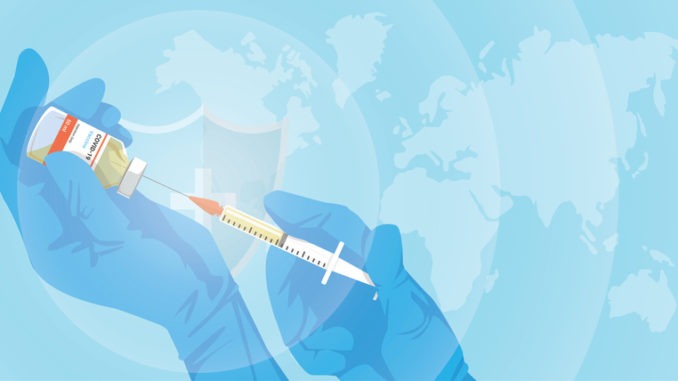
AstraZeneca’s COVID-19 vaccine has rarely been out of the news—and the headlines show no signs of abating. Jacqui Wise explains how miscommunication and politics created a nightmare for both the company and the global vaccination effort
CREDIT: This is an edited version of an article that originally appeared on The BMJ
Early troubles
Part of the problem may be that AstraZeneca isn’t a traditional vaccine manufacturer. Martin McKee, professor of European public health at the London School of Hygiene & Tropical Medicine, tells The BMJ, “A number of commentators have raised questions about the experience of the board in communicating some of the challenging messages around vaccines.”
Oxford University, which developed the vaccine, originally intended to partner with the US company Merck, but the UK government – which had invested £65.5m (€75.7m; $90.1m) in the vaccine’s development – insisted on a UK based company. GlaxoSmithKline reportedly turned down a partnership, as it had its own candidates in development.
Andrew Pollard, the Oxford vaccine group’s chief scientist, was delighted that the Anglo-Swedish company agreed to undertake the drug’s production, at cost and at volume, making it ‘a vaccine for the world’ – but it seems that no good deed goes unpunished, and AstraZeneca’s learning curve has been steep.
On 23 November 2020 AstraZeneca was criticised for the way it announced the vaccine’s efficacy. It had combined the results of different trials and had, critics said, missed out key details. Rather than coming up with a single figure for efficacy, like other vaccine manufacturers – Pfizer and Moderna had just a week earlier announced higher than expected efficacies of 91% and 95%, respectively – AstraZeneca announced an overall 62% efficacy and another of 90% in people who had originally received a half dose (this followed a dosing error in one arm of the Phase III trial, which, fortuitously, led to better results). The higher number was later reinterpreted as due to a longer gap between doses.
Media reports criticised how AstraZeneca had communicated the information about its trials. “There have been contradictions between statements given to investors, press releases, and internal documents,” says McKee. A scientific paper can’t be sent out for peer review if it has market-sensitive information such that a reviewer or editor could, potentially, exploit the market position. Preprint publications can face delays, which make it difficult to co-ordinate with market communications. McKee says that this may be why AstraZeneca relied on press releases. “But, that said, they should be consistent [with their information], and they haven’t always been so.”
Nevertheless, on 30 December 2020 the UK and Argentina became the first countries in the world to approve the AstraZeneca shot. The year ended with the company marking its first success in the vaccine field, but with the shine somewhat taken off – and there was more to come.
Annus horribilis?
On 25 January 2021 the German newspaper Handelsblatt claimed that the AZ vaccine had only eight per cent efficacy in over 65s. The report turned out to be baseless—but not before damage had been done to public confidence in the vaccine across the continent.
A few days later the European Medicines Agency approved the AstraZeneca vaccine for all age groups in the EU but, that same day, the French president, Emmanuel Macron, claimed that it was ‘quasi-ineffective’ for over 65s. After Macron’s comments Germany and France initially prevented the drug’s use in over 65s. Confusion over which age groups should have the vaccine has contributed, unsurprisingly, to a lack of confidence; in a YouGov poll, published on 22 March, more than half of people surveyed in France, Germany and Spain thought that the shot was unsafe.
Although other vaccines have also had supply problems, AstraZeneca seems to have become a political football between the EU and the recently Brexit-ed UK. The European Commission’s president, Ursula von der Leyen, threatened to block AstraZeneca from exporting doses of vaccine to the UK, and the Belgian MEP Philippe Lamberts accused the company of dishonesty and arrogance, saying that it had “over-promised and under-delivered.” At the time of writing the dispute is ongoing, alongside the recent blood clot issue.
Fallen heroes
Kate Bingham, former head of the UK’s vaccine taskforce, calls AstraZeneca “heroes” for the way the company picked up the vaccine and worked out how to test, manufacture and distribute it at low cost around the world. Speaking to the Financial Times, she said that the company had become caught up in geopolitics.
Ines Hassan, senior policy researcher with the Global Health Governance Programme at the University of Edinburgh, emphasises that AstraZeneca has not fallen short on meeting regulatory requirements; it submitted the necessary data, as expected, including when it recently submitted interim analysis findings to the FDA. However, communication about trial design early in development, and later about the number of patients with COVID-19 symptoms from its primary analysis could, perhaps, have been handled better, she says.
“One big lesson is that transparency is essential, especially with regulators and the general public,” says Hassan, while acknowledging that over-communicating without causing unnecessary alarm is a tricky balance to strike. She adds that the responsibility to communicate safety issues is not the manufacturer’s alone -it is the responsibility of regulators, policy-makers, public health academics and the media, among others.
Peter English, a retired consultant in communicable disease control, former editor of Vaccines in Practice magazine and immediate past chair of the BMA’s public health medicine committee, questions why the one vaccine being sold at cost price is the one that’s been the most vilified. “The amount of bad press they have got is not based on the science,” he says. “It seems completely disproportionate or unfounded. It looks like a lot of them are attacks on AstraZeneca itself, and seem to have an ulterior motive. It almost feels like there is a deliberate misinformation campaign.”
However, the consequences of AstraZeneca’s problems go far beyond one company’s reputation and profits. Its vaccine is an indispensable part of WHO’s plan to roll out two billion doses to 92 nations by the end of 2021, through the Covax initiative, and the UK’s order of 100m doses places AstraZeneca at the heart of its vaccination programme.
Many commentators worry that crumbling confidence in AstraZeneca’s vaccine may spill over to others, as the world is already grappling with vaccine hesitancy as an obstacle to wider coverage and an end to the pandemic.
As McKee says, “When you lose trust, it’s really difficult to regain it.”


Be the first to comment